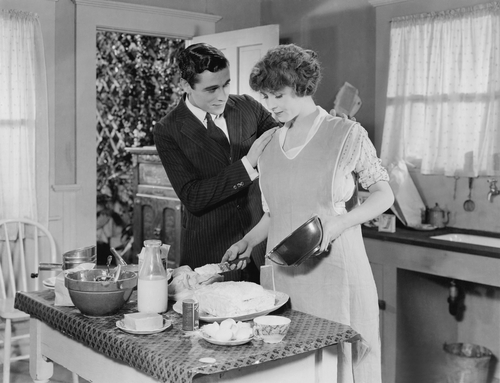 While we may moan about our other half not being able to stack the dishwasher like us or even manage to wash the clothes without them coming out a strange mucky colour, at least they give it a go. In fact, we should probably count ourselves lucky, our own grandmothers and probably even some of our mothers didn’t have it quite so easy.
While we may moan about our other half not being able to stack the dishwasher like us or even manage to wash the clothes without them coming out a strange mucky colour, at least they give it a go. In fact, we should probably count ourselves lucky, our own grandmothers and probably even some of our mothers didn’t have it quite so easy.
Starting in 1953, the Ladies’ Home Journal had a long running column titled Can This Marriage Be Saved? It featured real issues within a marriage and offered up advice - it is a true insight into marriage counselling well before women were seen as being equal to men. The column includes the woman’s complaint, her husband’s response and the counsellor's advice.
Here are three examples from the Huffington Post of just exactly how women were viewed back then:
May 1953, Amy and Joe
Amy, who ran a successful small business with her husband Joe, kicked him out of the family home after she found out he had been unfaithful. Joe asked the counsellor to “persuade Amy to take [him] back” saying “[The other woman] isn't worth one of Amy's smiles or even one of Amy's frowns."
The Counsellor’s advice: "Of course, she herself was largely responsible for Joe's infidelity. She practically drove her husband to find in the company of another woman a little of the praise and credit he was not receiving at home." They added “that Joe felt like a nobody who didn't count" and that Amy needed to “adopt a divergent set of values”.
April 1954, Lucy and Dan
Lucy’s was trying to leave her abusive husband after 19 years. She had previously tried to leave but her and her son were “dragged” back to the family home.
The Counsellors advice: “19 years is a good big chunk. Lucy and Dan were as intertwined as the roots of a tree. [Lucy], her child and her elderly aunt were financially dependent… Without Dan, Lucy was marooned"
October 1955, Patrice and Gid
Patrice had a good job at an advertising agency and was given a promotion. She writes how she rang her husband when she found out the good news. Gid who was a salesman earned less than his wife now, which he wasn’t happy about. He said he “didn't mind that [Patrice] had a darn good job" but still wanted her to be a “real” wife.
The Counsellor’s advice: Patrice was in the wrong because of "the way she handled her career, her husband [and] her child." And noted, "[she] grew to womanhood hating the unalterable fact that she was doomed to be a female in a man-made world." They added: she got a "true reward when she reduced her career to second place ... she became a successful wife and a successful mother."










